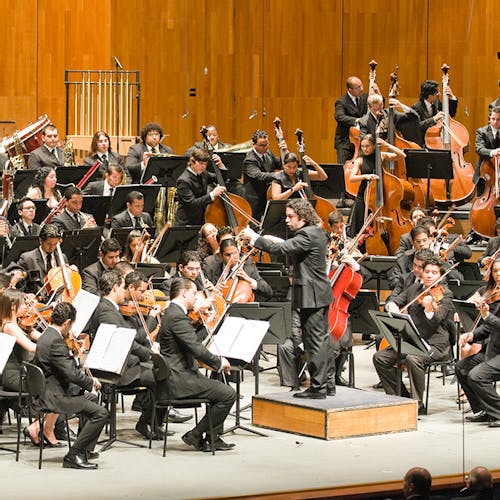Gustavo Dudamel
Venezuelan maestro Gustavo Dudamel is one of the most dynamic and internationally beloved conductors of our time. His extensive discography has won several Grammy Awards, and his work in cinema and television (including conducting Steven Spielberg’s retelling of West Side Story) has earned him a star on the Hollywood Walk of Fame. Documentary films have chronicled his public advocacy work, his appearances at the Hollywood Bowl and the Super Bowl, his honorary doctorates, and his residencies. His career is a treasure trove of work to discover and appreciate.
Featured Programs
The son of a trombonist and a voice teacher, Dudamel was born in Barquisimeto, an industrial city in northern Venezuela. He took up violin at age 10, and quickly began his training in El Sistema, Venezuela’s publicly financed music education program. Founded by educator, musician, economist, and activist José Antonio Abreu, El Sistema introduced many children from underserved backgrounds to the promise of classical music—and Dudamel was no different. “Music saved my life and has saved the lives of thousands of at-risk children,” he once told an interviewer. “Like food, like health care, like education, music has to be a right for every citizen.”
Dudamel’s rise was meteoric. After early studies in violin and composition, at age 14 he joined a conducting class led by Abreu himself. At 18, he was appointed music director of the Simón Bolívar Youth Orchestra, a Caracas-based ensemble founded by Abreu in 1978 and named for the 19th-century Venezuelan military and political leader who had led his country to independence from the Spanish Empire. Within a few years, as the orchestra began to tour widely in Europe, Dudamel caught the ear of legendary Maestro Daniel Barenboim and began apprenticing under him at the Berlin State Opera. Guest conductorships soon followed with the Israel Philharmonic Orchestra, City of Birmingham Symphony Orchestra, and Vienna Philharmonic. In 2007—mere weeks after his first appearance at Carnegie Hall with the Simón Bolívar Youth Orchestra—Dudamel stepped in to lead the New York Philharmonic. “Once this kinetic young conductor took the podium,” raved The New York Times, “the comparisons with [former music director Leonard] Bernstein were obvious … Clearly, the Philharmonic players were inspired by the boundless joy and intensity of his music making.”
Dudamel, who had made his US conducting debut in 2005 with the Los Angeles Philharmonic at the Hollywood Bowl, was invited back two years later. In 2009, he began his tenure as the LA Phil’s music director—originally a five-year contract that has since been extended three times. Deborah Borda, then president and CEO of the LA Phil, said she first witnessed Dudamel’s talent while watching him rehearse with La Scala opera’s orchestra. “Gustavo was conducting them in Mahler’s Fifth Symphony, and at the beginning, I thought, ‘Oh, dear, this is serious,’” she told Tricia Tunstall in her 2012 book Changing Lives. “But I sat and watched as he worked patiently and carefully with them. And by the end they sounded literally Viennese. It was miraculous. I knew then that he was just an incredible talent.” In February of 2023, the New York Philharmonic announced Dudamel’s appointment as its new music director, starting in 2026.
It makes sense that Dudamel would be given such steady engagements around the world: His is a particularly romantic sensibility, capable of locating the emotional heartbeat of most any piece he is given and finding daring new ways to present it. “Dudamel instinctively conveys the drama of everything he conducts,” The New York Times has marveled.
Showcasing his brilliant early work with the Simón Bolívar Youth Orchestra, a pair of concerts from 2007–2008 capture his equally dexterous handling of 18th-, 19th-, and 20th-century composers. The first, a grand performance of Beethoven’s “Eroica” Symphony recorded in Germany, perfectly demonstrates Dudamel’s sensitivity for the composer’s middle-period lyricism. (More recent works by Alberto Ginastera and José Pablo Moncayo bring festive excitement to the rest of the program.)
Dudamel’s 2008 reading of Mussorgsky’s fully scored Pictures at an Exhibition is evocative and cinematic, a dazzling orchestral foil to Beethoven’s more flamboyant Triple Concerto with pianist Martha Argerich, violinist Renaud Capuçon, and cellist Gautier Capuçon.
In 2014, Dudamel had the opportunity to lead his mentor Daniel Barenboim through two of Brahms’s towering piano concertos in a riveting performance with Barenboim’s Staatskapelle Berlin orchestra. Carnegie Hall+ subscribers can also witness Dudamel’s showmanship—and his natural flair for the piano concerto repertoire—in a 2020 recording of Liszt’s virtuosic Piano Concerto No. 1 with Evgeny Kissin (more nimble than ever) and the Vienna Philharmonic (opulent-sounding as always). The program takes flight with Stravinsky’s Firebird Suite, a magical Russian fairy tale reimagined for modern times.
Yet even as Dudamel has become a fixture on the world’s most storied stages, he has never forgotten his roots in the Venezuelan musical programs where he got his start. Inspired by his transformative education as a youth in El Sistema, Dudamel, the LA Phil, and its community partners founded Youth Orchestra Los Angeles in 2007—an ensemble that now provides 1,500 young people with free instruments, intensive music instruction, academic support, and leadership training. Dudamel also created the Dudamel Foundation in 2012—which he co-chairs with his wife, actress and director María Valverde—with the goal to expand access to music and the arts for young people by providing tools and opportunities to shape their creative futures.
“The orchestra, you know, it’s a community. It’s a little world where you can create harmony,” he told Tunstall. It’s a sentiment that runs through his work—and an artistic impetus that Carnegie Hall+ subscribers can now experience for themselves.
Photography: Gustavo Dudamel at Beethovenfest Bonn by Magdalena Lepka, Simón Bolívar Youth Orchestra of Venezuela by Bryan Reinhart, Daniel Barenboim: Brahms's Piano Concertos by Matthias Creutziger; all other photography by Marco Borrelli.
Subscribe to Carnegie Hall+ Today
Stream exceptional performances anytime, anywhere from the comfort of your home for just $7.99 a month. Discover Carnegie Hall+ for free by signing up for a seven-day free trial* on the Apple TV app or Prime Video Channels.































